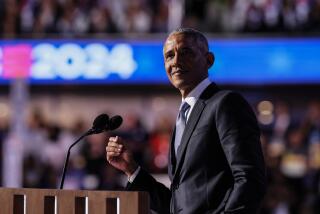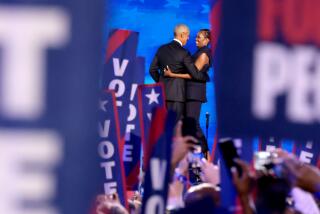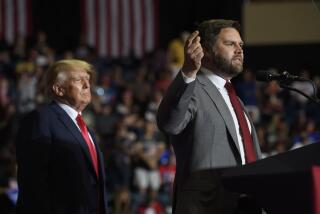The Obama-McCain miracle
Previously, Schnur and Cain discussed the GOP’s future, the political and historical implications of Barack Obama’s victory, voter enthusiasm about the election and the factors that shifted the race in the Democrats’ favor.
A vote on Iraq became a vote on the economy
Point: Dan Schnur
The great irony of a presidential election in which almost two-thirds of voters listed the economy as the issue of greatest concern to them was that neither Barack Obama nor John McCain decided to run for president for reasons having anything to do with the economy. When this campaign began to take shape two years ago, it was the Iraq war that propelled both these candidates into the race. And although they both devoted time along the trail to discussions of jobs, trade and taxes, both were clearly motivated by the seminal foreign policy challenge of that time.
Both Obama and McCain used Iraq as the prime differentiator between themselves and the rest of their respective primary fields. Obama, of course, was the only major Democratic candidate who opposed the war from the beginning, a position that built the grass-roots effort that ultimately brought him his party’s nomination. McCain’s campaign was close to extinction when his ongoing support for an increased U.S. troop presence there began to fuel his comeback against a Republican field that had left him in the dust.
As the general election campaign progressed, first Obama and then McCain adjusted their messages to focus more heavily on economic matters. But if Wall Street had collapsed in September 2007 rather than 2008, it’s more than reasonable to assume that John Edwards and Mitt Romney would have been their parties’ presidential nominees. Both were more reliable and confident advocates of the two conventional brands of economic orthodoxy than Obama and McCain had been, but neither was able to develop the same level of respect from primary voters on foreign policy and national security matters. So both men most likely watched election returns from their homes on Tuesday night.
One other factor worked to Obama’s and McCain’s benefit during the primary season -- a deepening distrust among voters of all ideological stripes toward the Washington political hierarchy. McCain first attempted to run as the candidate of his party’s establishment and failed dismally in that effort. It was only after his near-death experience last year that he reverted to the role of outsider and underdog that he began his comeback. Obama’s positioning was even more impressive, as he successfully recast Hillary Clinton’s message of experience as the ultimate in conventional and traditional politics. Almost one year after the fact, it’s still extraordinary to realize that the first plausible female candidate in our nation’s history was dismissed as business as usual.
By the fall, the deteriorating economy had broadened the thirst for change from a base of Democratic Party regulars and anti-war activists to encompass a majority of the electorate. McCain’s only chances for victory slipped away as the success of the surge he championed in Iraq was obscured by the economic collapse here at home. But looking back to the pivotal moments along the primary campaign trail last spring, it’s clear that neither candidate could have possibly come this far without challenging their parties’ conventional wisdom on a war that -- to most Americans -- barely seems to matter anymore.
Dan Schnur, national communications director for John McCain’s 2000 presidential bid and a veteran of four presidential and three California gubernatorial GOP campaigns, is the director of the Jesse M. Unruh Institute of Politics at USC.
Obama was the more skillful candidate
Counterpoint: Bruce E. Cain
Politics, like poker, is a combination of skill and luck. To get to the final table, you need both. Undeniably, both candidates in this contest were able politicians and, to use an Obama expression, “likable enough.” But both candidates also drew some really high cards, defeating opponents who under other circumstances might have beaten them.
You are right, Dan, that the rationale of John McCain’s candidacy was undercut by changing economic circumstances and diminished interest in the Iraq war. Had the economy turned upward and, say, Russia invaded Poland, McCain would have been in a better position. So luck worked against him in the fall. By comparison, he drew aces in the primary. McCain’s candidacy actually failed three times: once in 2000 and twice in 2006-08. Let’s remember that he was left for dead when his campaign collapsed before the primary and revived miraculously because conservatives could not agree on Romney versus Mike Huckabee, and the party establishment concluded that McCain had the best shot at defeating the Democrats under the adverse circumstances. In the primary, McCain was also greatly aided by the GOP’s winner-take-all rules, allowing him to garner a majority of delegates by winning many states with small vote pluralities.
The luck of the draw aside, McCain did not play his hand skillfully in the fall. The harsh glare of the presidential limelight revealed the good and bad of his character: impetuous rather than steady, bold but not given to thorough investigation of his options and gregarious in a cranky way. Fairly or not, the bad decisions concerning Sarah Palin and the bailout drama were attributed to his erratic personality. We also got the answer about whether two mavericks would get along: They would not. Palin was revealed to be far less likable, and if the recent revelations from her staff are true, she was even shallower, more opportunistic and untruthful than we knew. And heeding strategist Steve Schmidt’s advice about cutting himself off from the media took McCain out of his game. In the end, McCain has the right temperament for the Senate but not for an executive position. The voters got that right.
Barack Obama was also the beneficiary of good luck, but, and you may disagree, he was also the more skillful player. Like McCain, the party’s primary rules played to his advantage in two senses. First, if the Democratic Party had used winner-take-all rules, Hillary Clinton probably would have won the nomination after Super Tuesday on Feb. 5 because of her advantage in large states. Second, while the lengthy primary contest created heated divisions in the ranks, it made Obama a stronger, better-known candidate and burned up most of the media fuel surrounding the Rev. Jeremiah Wright Jr. and William Ayers before the fall campaign. And then, of course, there was the luck of the economic collapse.
In your view, Dan, the economic crisis was an object that randomly fell from the sky and hit the poor unsuspecting Republican candidate on the head as he was headed to a close election. I see it a little differently. There were many clear warnings prior to the election that something would eventually drop from above, and one candidate, Obama, was more adept than the other in protecting himself. His cool, unruffled and measured responses were simply more appropriate than McCain’s. The debates revealed that Obama was more articulate, thoughtful and gracious than his Republican opponent. As the polls of undecided voters showed, the way Obama handled himself won over a majority of undecided and independent voters and allayed fears that he was an empty celebrity or angry radical.
In the end, the meaning of this election was that a majority of voters could look pass race and negative campaigning and make a choice on the merits. McCain, an admirable man in many respects, was not the best man for that job. The Obama victory was as much a triumph of meritocracy as it was a new chapter in our racial history.
Bruce E. Cain is a political science professor at UC Berkeley and executive director of the University of California Washington Center.
More to Read
A cure for the common opinion
Get thought-provoking perspectives with our weekly newsletter.
You may occasionally receive promotional content from the Los Angeles Times.










